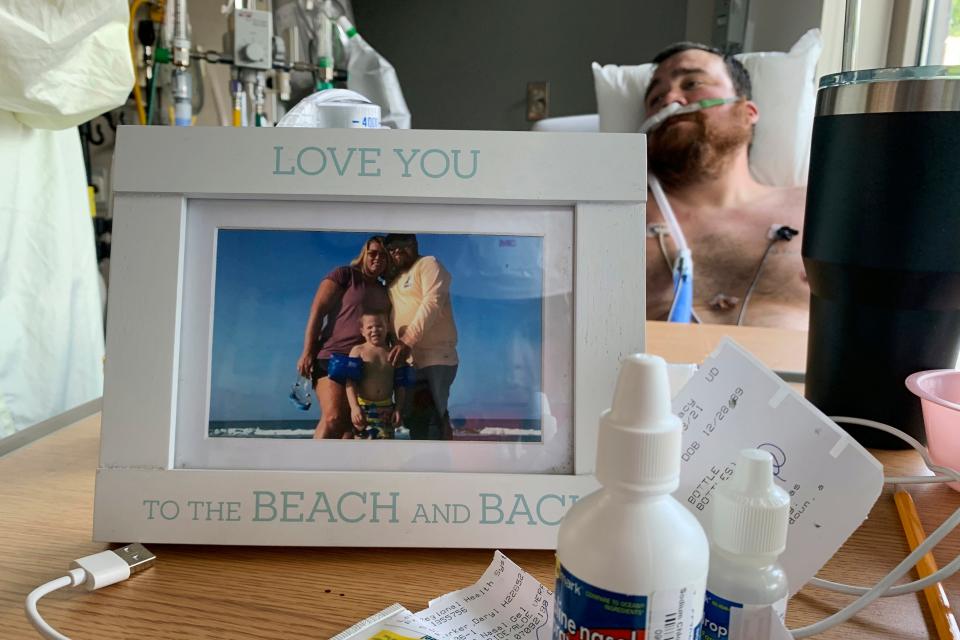Fact check: Ivermectin is not a proven treatment for COVID-19
The claim: Ivermectin is an effective treatment for COVID-19
Several states have logged 1 million coronavirus cases as the highly contagious delta variant continues to wreak havoc across the country. To slow the spread of the virus, public health officials are encouraging Americans to get vaccinated.
But on social media, some have hatched a different plan to treat COVID-19: using anti-parasite products designed for farm animals.
"Less than a hour after taking Ivermectin paste per my body weight I was mostly symptom free," reads an Aug. 8 testimonial on Facebook. "Was in bad shape until then!"
The post, which includes a photo of an apple-flavored paste for treating parasites in horses, only accumulated about 200 shares within three days. But similar posts touting ivermectin have been widely shared across platforms, and farm supply stores across the country are running low on anti-parasitics for horses, cows and pigs.
"(Hydroxychloroquine) and treatments like ivermectin cure coronavirus within days. Always has," an Instagram user wrote Aug. 4.
They don't.
Fact check: Fauci's emails don't show he 'lied' about hydroxychloroquine
"There is no evidence that ivermectin is effective for treatment," Dr. Krutika Kuppalli, an assistant professor at the Medical University of South Carolina, said in an email.
USA TODAY reached out to the social media users who shared the claim for comment. One of them, Shayne Ward, said in a Facebook message that he's heard "countless stories of people that Ivermectin has helped get over Covid."
"Fact Check that!" he wrote.
Ivermectin not proven to treat COVID-19
Ivermectin has been promoted as a COVID-19 cure throughout the pandemic. Scientists are still studying whether the drug could be used as a treatment, but so far there's little data to suggest it's effective against COVID-19.
Ivermectin is approved by the U.S. Food and Drug Administration to treat certain kinds of parasites and neglected tropical diseases, including scabies and parasitic worms. It is not approved to treat any viruses.

Some limited studies have suggested ivermectin could help treat COVID-19. But other, more rigorous research has found little or no impact.
"The reason for the interest in ivermectin is that studies in the lab have shown it can block viruses from multiplying in experimental settings – i.e. in a petri dish – and so people hoped this would mean it could help treat COVID-19 in people too," Dr. Denise McCulloch, an infectious disease specialist with the University of Washington's School of Medicine, said in an email. "Unfortunately, the few high-quality studies that have been done to date do not demonstrate a beneficial effect of ivermectin when it is used in people with COVID-19."
Two of the highest-quality studies available include a double-blind, randomized trial in Colombia and a meta-analysis of 14 studies involving more than 1,600 participants, McCulloch said.
More: What science has learned works and what doesn’t in COVID-19 treatments
The Colombia study found that, among adults with mild COVID-19 cases, a five-day course of ivermectin "did not significantly improve the time to resolution of symptoms." The meta-analysis, published in late July, concluded that "the reliable evidence available does not support the use of ivermectin for treatment or prevention of COVID‐19 outside of well‐designed randomized trials."
Those findings have been clouded by the publication of lower-quality studies and research with potential sources of bias, experts say.
One non-peer reviewed study widely cited by ivermectin proponents was posted on Research Square in November. The preprint platform withdrew the study in July "due to an expression of concern communicated directly to our staff."
A peer-reviewed meta-analysis of 15 trials, published in the July/August issue of the American Journal of Therapeutics, found that "large reductions in COVID-19 deaths are possible using ivermectin." But experts told PolitiFact, an independent fact-checking outlet, that some of the trials the study included were not high-quality, and some of its authors were affiliated with a pro-ivermectin group.
Absent more randomized, controlled clinical trials, scientists remain skeptical about the benefits of ivermectin in treating COVID-19.
"To extrapolate from how much drug is needed to work in the test tube to how much is required to work in a human being against the virus makes these trials and all the meta-reviews published less than worthless – it’s dangerous," Dr. Benhur Lee, a microbiology professor at Mount Sinai's Icahn School of Medicine, said in an email.
Officials say drug should 'only be used within clinical trials'
Public health officials and pharmaceutical companies have advised against taking ivermectin to treat COVID-19.
The FDA said in April 2020 that people should not take ivermectin unless it's "prescribed to them by a licensed health care provider and is obtained through a legitimate source." The agency reiterated that position in March.
Fact check: 6 of the most persistent misconceptions about COVID-19 vaccines
"The FDA has not reviewed data to support use of ivermectin in COVID-19 patients to treat or to prevent COVID-19; however, some initial research is underway," the FDA says on its website. "Taking a drug for an unapproved use can be very dangerous."
The FDA warns that ivermectin products for animals can be toxic to humans due to their high concentration of the drug. ABC News reported in February that there had been an uptick in calls to poison control centers related to ivermectin.
The World Health Organization has also warned against using ivermectin to treat COVID-19, saying the drug should "only be used within clinical trials." Merck, the pharmaceutical company that makes ivermectin, said in February it had found "no scientific basis for a potential therapeutic effect against COVID-19 from pre-clinical studies."

Clinical trials studying whether ivermectin could be used to treat COVID-19 are ongoing. Until those trials conclude, experts told USA TODAY it's tough to say with certainty how the drug affects COVID-19 patients.
Our rating: Missing context
Based on our research, the claim that ivermectin is an effective treatment for COVID-19 is MISSING CONTEXT. Scientists are still studying whether ivermectin could be used to treat COVID-19. While some studies have shown promise, experts say the more scientifically rigorous studies conducted to date more frequently find no connection between use of ivermectin and improved COVID-19 recoveries. Public health agencies and pharmaceutical companies have warned against using ivermectin to treat COVID-19.
Our fact-check sources:
The Daily Beast, Aug. 6, Pharmacists Fight Off COVID Truthers Demanding Horse Medicine Instead of the Jab
USA TODAY, Aug. 10, School officials in Texas, Florida defy governors' ban on mask mandates; professors 'freaking out' about exposure: Live COVID-19 updates
USA TODAY, Aug. 8, Dr. Anthony Fauci: Get vaccinated to stop risk of an even deadlier COVID variant
CrowdTangle, accessed Aug. 11
ABC News, Feb. 26, Do-it-yourself COVID treatments an evolving threat
USA TODAY, June 3, Fact check: No, email to Fauci doesn't contain origin of a 'coronavirus bioweapon'
U.S. Food and Drug Administration, April 2020, FDA Letter to Stakeholders: Do Not Use Ivermectin Intended for Animals as Treatment for COVID-19 in Humans
U.S. Food and Drug Administration, March 5, Why You Should Not Use Ivermectin to Treat or Prevent COVID-19
World Health Organization, March 31, WHO advises that ivermectin only be used to treat COVID-19 within clinical trials
PolitiFact, Aug. 9, No evidence yet concluding that ivermectin is an effective COVID-19 treatment
PolitiFact, April 23, Fact-checking claim about the use of ivermectin to treat COVID-19
USA TODAY, May 21, Fact check: No link between India's falling COVID-19 cases and hydroxychloroquine
USA TODAY, March 14, What science has learned works and what doesn’t in COVID-19 treatments
National Institutes of Health, accessed Aug. 11, COVID-19 Treatment Guidelines: Ivermectin
Merck, Feb. 4, Merck Statement on Ivermectin use During the COVID-19 Pandemic
University of Minnesota Medical School, May 25, U of M Medical School receives $1.5M to launch nation’s first ivermectin COVID-19 treatment clinical trial
Dr. Krutika Kuppalli, Aug. 11, Email exchange with USA TODAY
The Guardian, July 15, Huge study supporting ivermectin as Covid treatment withdrawn over ethical concerns
Research Square, accessed Aug. 11, Efficacy and Safety of Ivermectin for Treatment and prophylaxis of COVID-19 Pandemic
Dr. Denise McCulloch, Aug. 11, Email exchange with USA TODAY
Dr. Benhur Lee, Aug. 11, Email exchange with USA TODAY
PolitiFact, June 30, What to know about a pro-ivermectin group’s study touting the drug versus COVID-19
Cochrane, July 28, Ivermectin for preventing and treating COVID-19
Mark Namchuk, Aug. 11, Email exchange with USA TODAY
Slate, Aug. 10, Farm Supply Stores Are Running Short on a Horse Dewormer/Pseudoscience COVID Cure
ClinicalTrials.gov, accessed Aug. 11, ACTIV-6: COVID-19 Study of Repurposed Medications
JAMA, March 4, Effect of Ivermectin on Time to Resolution of Symptoms Among Adults With Mild COVID-19
American Journal of Therapeutics, July/August, Ivermectin for Prevention and Treatment of COVID-19 Infection: A Systematic Review, Meta-analysis, and Trial Sequential Analysis to Inform Clinical Guidelines
Shayne Ward, Aug. 12, Facebook exchange with USA TODAY
Thank you for supporting our journalism. You can subscribe to our print edition, ad-free app or electronic newspaper replica here.
Our fact-check work is supported in part by a grant from Facebook.
This article originally appeared on USA TODAY: Fact check: Ivermectin not proven COVID-19 treatment
